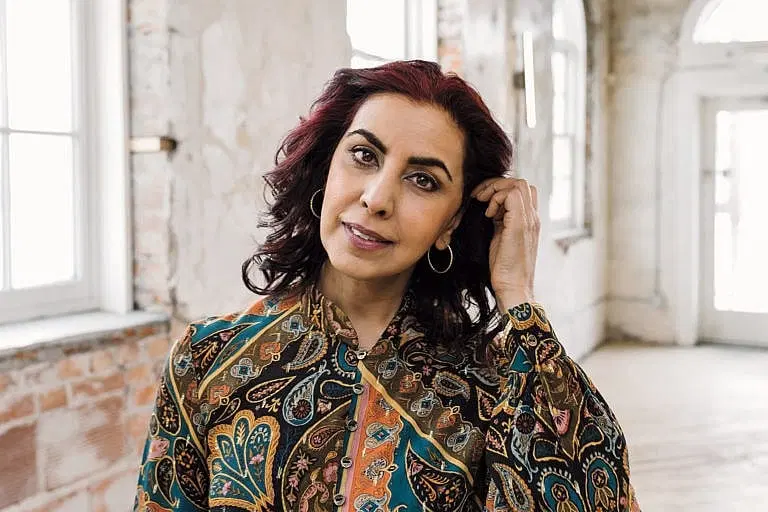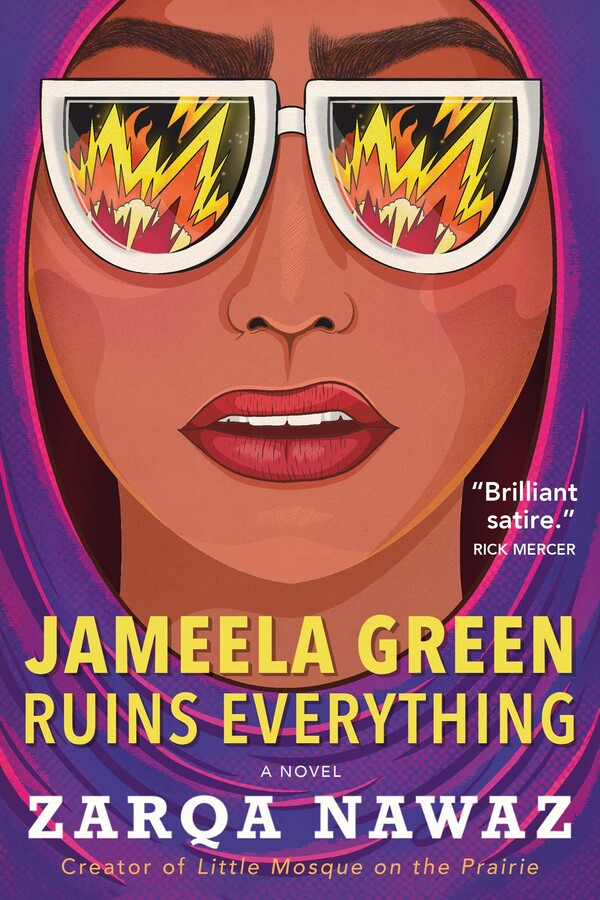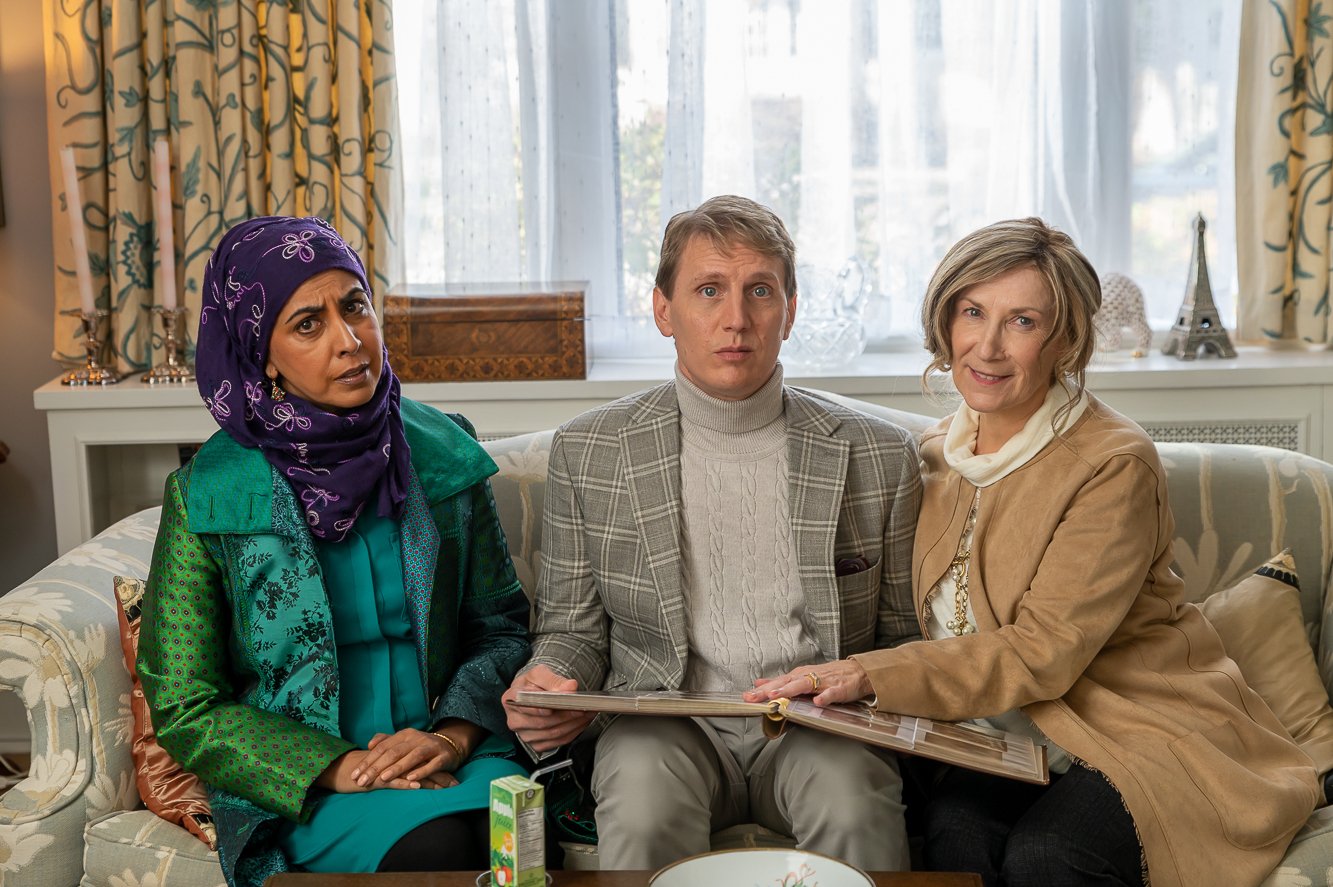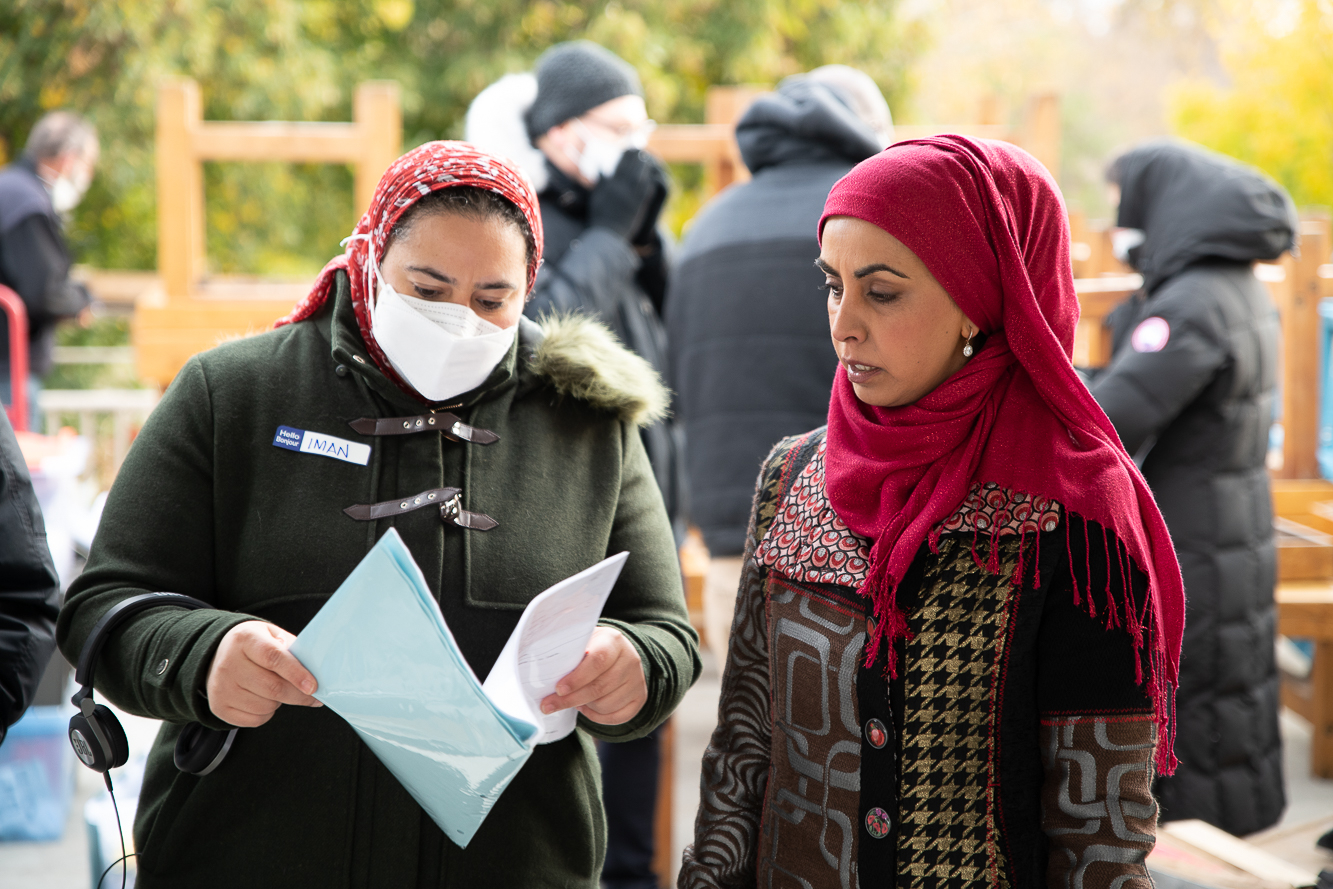Zarqa Nawaz had a hit show, then a decade-long dry spell. She’s ready for her second act.
She had a hit with Little Mosque on the Prairie. Then came a years-long creative slump–until she landed a book deal and TV series on the same day.

Zarqa Nawaz (Photograph by Carey Shaw)
Share
Things were going great for Zarqa Nawaz. Little Mosque on the Prairie, the trailblazing CBC series she created and the first Muslim-centric sitcom on western TV, was a hit for six seasons, airing its finale in 2012. Two years later, her light-hearted memoir, Laughing All the Way to the Mosque, was released to critical acclaim, cementing her reputation as one of Canada’s most beloved comedians. Then Zarqa Nawaz’s phone stopped ringing as much it used to. For almost a decade, she lived through a period of professional uncertainty that felt like a test of faith.
She chipped away at a provocative satirical novel—a comedic spin on ISIS, and America’s policy in the Middle East—but had trouble selling it to publishers, who were concerned about its risky subject matter. She tried her hand at advice columns and radio hosting, but ultimately had trouble selling those jobs to herself. She felt like she’d given up.
In 2019, she was the television anchor for the six o’clock news on CBC Saskatchewan. During that time, at a social gathering, a close friend sidled up beside her and said something that hit her deep in her gut: “You know you’re throwing your life away, right?”
MORE: With ‘Turning Red,’ Domee Shi wants to tell the story of your childhood
Soon, Nawaz found the gumption to quit her CBC job and turned back to her creative projects. She started performing a stand-up act about generational differences in dating. She was headlining shows within six months, and hoping she could Jerry Seinfeld her way back onto television. Then the pandemic hit. Under lockdown, she came up with an idea for another TV show, this time about a divorced Muslim woman trying to get back at her ex. At the same time, she devoted herself to refining the novel.
It’s hard not to interpret what happened next as an act of fate. On Sept. 21, 2021, Nawaz received an offer from Simon & Schuster to buy her novel. Hours later, she got a deal with CBC Gem to produce her series. “I felt this wave of joy,” she says. “Now I tell myself, ‘Remember that day. The next time you go through a dry spell, remember that day when everything worked out. That day will happen again.’ ”

Nawaz, 54, is now experiencing a career renaissance: her novel Jameela Green Ruins Everything lands on bookshelves on March 8, and her six-episode series Zarqa debuts on May 13. Both feature middle-aged Muslim women who blossom into funny, flawed heroines.
On the small screen, Nawaz has pioneered the art of creating stereotype-defying Muslim characters. Now a new cast of writers and filmmakers is building on that success, rising up through the hole she made in the glass ceiling. Muslim heroines in pop culture are finally starting to take control of their own destinies—and so is Nawaz.
***
Nawaz’s family moved from the U.K. to Canada in 1972, when she was five years old. Her parents settled in Brampton, Ont., and she grew up attending camps with the Muslim Youth of North America, an experience that planted the seeds for her later work.
She earned a journalism degree from Ryerson and got a job at CBC Radio. In 1994, she moved with her husband and their first child to Saskatchewan, where he would practise medicine. Soon after, Nawaz decided she wanted to be a filmmaker and, in 1995, took a three-week course at the Ontario College of Art and Design. There she produced her first film, BBQ Muslims.
In the five-minute short, a pair of innocent Muslim brothers (played by her own brother and his friend) get locked up for bombing someone’s backyard barbecue in Oakville, Ont. Meanwhile, the real perpetrators, white members of an anti-barbecue group, are disappointed not to get credit for the attack and capitalize on the publicity.
To Nawaz’s surprise, the short was selected to screen at the Toronto International Film Festival in 1996. “I sat in the audience and watched people watch the film, and they were laughing,” she says. “That’s when I realized I could make comedies about political issues.”
BBQ Muslims was one of the first times Nawaz used zany plots to bust stereotypes about Muslim people. Whenever we see Muslims in film, she says, we only see stereotypical stories. “It’s always the life of a refugee, a terrorist, an oppressed woman,” she says. “And you don’t see the ordinary.”
In 2005, Nawaz created a National Film Board (NFB) documentary called Me and the Mosque, on the subject of male-female segregation and the influence of conservative Saudi Arabian ideals on North American mosques. The NFB screened the film at a festival in Banff, Alta., where she met someone from the Saskatchewan production company WestWind Pictures and pitched a TV comedy that played on the same themes. “I thought to myself, ‘What if the imam wasn’t from a culturally conservative country? What if he was born and raised in Canada? What if he came from a different profession, like law, and like me, left Ontario to live in Saskatchewan?’ ” Within months, the CBC had picked up the show.
Little Mosque, set in the small, fictional town of Mercy, Sask., was groundbreaking for its ensemble cast of Muslim characters. It dealt with the dynamics between Christian and Muslim neighbours and how Muslim people were treated post-9/11—but it always had a light touch.
For example, in the pilot, an airport passenger misinterprets the new imam’s phone conversation with his mom: “No, don’t put Dad on. I’ve been planning this for months, it’s not like I dropped a bomb on him,” he says in the call. “If Dad thinks it’s suicide, so be it. This is Allah’s plan for me.” Of course, he’s referring to his dad’s misgivings about the new job, but it takes a while to convince airport security. Nawaz’s favourite episode, “Eid’s a Wonderful Life,” from Season 2, depicts the mayhem of having Christmas and Eid ul-Adha scheduled a few days apart (they only fall during the same month once every 33 years). It ends on a montage of neighbours from competing holiday parties breaking bread together, set to a cover of Peace Train by Yusuf/Cat Stevens. “That year Christmas and Eid ul-Adha were within days of each other, and I remember going shopping and there wasn’t any butter left. The grocery stores couldn’t handle Christians, Muslims and Jews fighting over crucial ingredients,” she says. In the episode, she delighted in that absurd chaos.

Nawaz, shown here with co-stars Rob van Meenen and Bonnie Senger, produces and stars in the new series 'Zarqa' on CBC Gem (Courtesy of Peter Scoulard and CBC Gem)
Although these plots were radical for the time, the show was still a traditional sitcom, formulaic and safe enough that some critics wanted to see more aggressive social commentary. Looking back now, Nawaz wishes she’d pushed things a little farther, like in an episode called “Ban the Burka,” inspired by niqab bans in Europe: “I regret not making the niqabi character more prominent. There are so few opportunities for women in niqab to speak for themselves.”
Over its six seasons, the show was a ratings hit and earned international attention. “It proved to networks that you don’t need to have white leads in order to have a white audience,” Nawaz says. “People are willing to watch good television.”
Claire Ross Dunn wrote for the show for two seasons. It was a big writers’ room, but by coincidence, she ended up sitting next to Nawaz. “To be honest, she always seemed a bit like a Muslim Mary Tyler Moore,” Dunn says.
The two would laugh about their lives and their day-to-day peccadilloes, like the insanity of trying to get their kids to soccer on time (Nawaz is a mother of four), or getting one of their sons to do his math homework when he didn’t want to. They figured out how much they had in common, just as the show was trying to do for a Canadian audience of Muslims and non-Muslims alike.
Dunn found it thrilling to be a part of something that had the potential to make society better. It wasn’t just fluffy TV. “I had watched a lot of Homeland. I had watched a lot of those American procedurals where Muslims are constantly the villain. It was a radical to make a light-hearted comedy about Muslims.”
Representation and diversity change the way viewers think about other people, Nawaz says. “If you’re never going to meet someone outside of your cultural bubble, then television might be the place you meet people.” A 2017 study from researchers at the University of Wisconsin-Madison found viewers had “lower scores on implicit and explicit measures of prejudice” after watching Little Mosque, compared to a second group that watched an all-white sitcom. “It matters,” Nawaz says. “TV shows matter to how we humanize people.”
***
Jameela Green, the protagonist of Nawaz’s new novel, is an everyday middle-aged Muslim woman who has just written a memoir about being an everyday middle-aged Muslim woman, but she’s losing hope that it will ever top the New York Times bestseller list. Nawaz admits there’s some autobiography in the character. “To write a satire about Muslims, terrorism and ISIS was not easy or necessarily advisable,” Nawaz writes in the author’s note for Jameela Green Ruins Everything. It’s a comedy of errors about an ordinary Muslim woman thrust into a high-stakes international crisis. It’s also a tale of internal struggle, interspersed with characters’ private prayers to God. Throughout, Jameela struggles with keeping her faith and believing that things will work out, no matter what. “If I look back on the book now, those are the things I was trying to convince myself while I was writing it,” Nawaz says.
The novel is provocative and cheeky: the fictionalized ISIS group is called the Dominion of the Islamic Caliphate and Kingdom, and the original title of the book was The Rise and Fall of DICK. Nawaz knows that some scenes—especially when characters find themselves overseas in the grips of a murderous terror group—might push the limits of what an audience wants to experience, or what they find funny. She heard plenty about it from the publishers and editors who read her drafts.
“At a certain point, I gave up thinking that it would ever get sold because too many people were saying, ‘This book is just too much, over the top, wacky, crazy.’ They’re like, ‘Can you bring it down?’ And I’m like, ‘No,’ ” she says. “These things happen in the world. I’m not making this stuff up.”
She asked Omar Majeed, a filmmaker and editor, to read the book. Majeed met Nawaz in the mid-2000s, when he participated in a National Film Board fellowship program and she was assigned as his mentor. He was impressed by her devotion to Islam on the one hand and her casual unflappability on the other: “I’ve never met someone who is that by-the-book in regards to religion, but extraordinarily open-minded in every other way.”

'Americanish' director Zawahry (left), shown here with Nawaz, directed the first two episodes of 'Zarqa' (Courtesy of Peter Scoulard and CBC Gem)
He applauded the book for its bravery, and for addressing difficult subject matter, but predicted it could be a challenging read for many in their community: “Because Muslims and other Brown folks in western society still are feeling the immediate effects of their marginalization,” Majeed says. “And there are still deep, deep scars. There’s a sensitivity in our community. I understand it, but I know that we have to work through it.”
The needle Nawaz is trying to thread reminds Majeed of The Producers, Mel Brooks’s 1967 black comedy about playwrights who create a musical about Adolf Hitler. The film was controversial, criticized by the Jewish community for seeming to make light of the Holocaust. Later, in a 1978 interview in Maclean’s, Brooks said: “I think you can bring down totalitarian governments faster by using ridicule than you can with invective.”
READ: Tanya Talaga is telling the stories Canada needs to hear
Nawaz says she’s facing criticism that she’s reinforcing stereotypes, and that Muslims don’t want to talk about the post-9/11 time period. “But it did happen,” she says. “Just because things are better for us in the media doesn’t mean there still isn’t suffering going on. Those terrorists did exist in the world, but I’m trying to put a different spin on it.”
***
Little Mosque paved the way for more diverse Canadian TV series, like Kim’s Convenience. And yet for a long time it was still an outlier, a unique flashpoint in pop culture’s portrayal of Muslim characters. Iman Zawahry, a University of Florida lecturer and director of the 2021 feature film Americanish, about a group of young Pakistani-American women in New York, says all that changed with the election of Donald Trump and his decision to target Muslim-majority countries with a travel ban. “That was the moment that a bunch of white male executives were like, ‘Hey, it’s time for us to tell stories about Muslims,’ ” says Zawahry. “The hijab became the new black. There was a hijabi in every single commercial.” In its 14th season in 2017, for example, Grey’s Anatomy introduced a hijabi doctor for the first time.
Meanwhile, the political atmosphere also made executives more receptive to ideas from Muslim creators. In the U.S., Ramy Youssef’s dramedy Ramy, which debuted in 2019, gave audiences new insights into the male Muslim-American experience. In the United Kingdom, Nida Manzoor’s We Are Lady Parts, whose first season aired in 2021, features a group of young Muslim women, including a niqabi, trying to make it as an eponymous punk-rock outfit. In Canada, CBC Gem’s 2021 Sort Of, from Bilal Baig and Fab Filippo, explores the life of the non-binary millennial child of Pakistani immigrants. Ms. Marvel, scheduled for release this summer, will feature the blockbuster Marvel franchise’s first Muslim superhero character, played by Markham, Ont., actor Iman Vellani. And the second novel from Toronto author Uzma Jalaluddin, Hana Khan Carries On, is being adapted for the silver screen by Mindy Kaling and Amazon Studios.
Zawahry says she cried while watching We Are Lady Parts, and not because of the plot: “I cried because what I’ve been trying to do my entire career is actually happening.” Nawaz tapped her to direct the first two episodes of Zarqa, a comedy series about a character rarely (perhaps never) explored on screen: a middle-aged, divorced Muslim woman. The plot follows Zarqa, played by Nawaz herself, as she learns her ex is marrying a young, white yoga instructor, and reacts in all kinds of imperfect ways—starting with a promise to find a white surgeon named Brian to bring as her plus-one to the wedding. In the trailer, she asks Siri for the “No. 1 dating app for people over 50,” whispering into her iPhone, “white people only.”
When Nawaz’s career seemed stalled during recent years, she felt at times like she was drowning. She would pray to God: “Hey, man, what gives?” But she kept her faith. “As a Muslim, we are to be tested, and you are tested by loss. The whole purpose of it is to become stronger, to learn how to trust and not give up.”
Now she has passed the test, and she has a new appreciation for the power of patience. “You should never say never. You should always trust and have faith,” she says. “That’s what all this meant: be patient, even if it means waiting a decade.”
This article appears in print in the April 2022 issue of Maclean’s magazine with the headline, “Zarqa Nawaz’s leap of faith.” Subscribe to the monthly print magazine here.